LoRa Wireless RF Transceiver Modules
Updated: 15Aug2024 20:00:13 UTC 2024-08-15T20:00:13Z
Rating: (0 reviewsThis article has not been rated yet)
LoRaLoRa (short for Long Range) is a spread spectrum modulation technique derived from Chirp Spread Spectrum (CSS) technology. (short for Long Range) is a wireless radio communication spread spectrum modulation technique derived from Chirp Spread Spectrum (CSSChirp Spread Spectrum) technology that has the capability of long-range communication with low power consumption at the cost of a narrow bandwidth. It encodes information on radio waves using chirp pulses that provides good interference immunity and can be received across great distances depending on the hardware capabilities.
The LoRa modules covered here communicate over ranges from several kilometers up to 20km using the license-free sub-gigahertz radio frequency bands of 433MHz/868MHz/915MHz, and are typically controlled using the I/OInput/Output ports of a microcontroller, USBUniversal Serial Bus serial adapter, or SBCSingle Board Computer with standard communication interfaces such as UARTUniversal Asynchronous Receiver-Transmitter and SPISerial Peripheral Interface.
REYAX Modules
REYAX RYLR896 868/915MHz Module
The REYAX RYLR896 LoRa module is a radio transceiver designed to work in the 868/915MHz ISMIndustrial, Scientific, and Medical radio bands band with a typical range of 4.5km and max range of 15km. The board has a size of 25mm x 17mm (0.98in x 0.67in ) that contains a Semtech SX1276 RFRadio Frequency Engine and a STM32L151C8 ARM Cortex-M3 32-bit MCUMicrocontroller Unit.
Data interfacing and control are performed by ATShort text string commands where the AT stands for ATtention and every command line starts with "AT" or "at". commands through 2-wire UARTUniversal Asynchronous Receiver-Transmitter (RXDReceive Data, TXDTransmit Data). The interface pins for power, data, and reset are breadboard friendly with 2.54mm (0.1in) spacing. The power and logic are 3.3V with a supply ranging from 2V to 3.6V DC and up to 43mA max transmitting current.
This module comes with a spring antenna, but also has pads on the back of the board for soldering a uFL/IPEX connector for an external antenna. The radio frequency can be selected from 862MHz to 1020MHz, transmitting power is programmable from -4dBmDecibel-milliwatts (dBm) is a power level that expresses decibels in terms of milliwatts on a logarithmic scale. (0.4mW) to +15dBm (31.6mW), and receiving sensitivity goes down to -148dBm.
Data is transmitted in packets with a payload message up to 255 bytes in length, AES-128AES-128 is a variant of the Advanced Encryption Standard (AES) block cipher, specified with a key size of 128 bits, a fixed block size of 128 bits, and 10 transformation rounds that convert the input (plaintext) into the final output (ciphertext). data encryption, 2 byte CRCCyclic Redundancy Check checksum for message error detection, and can communicate with up to 255 modules on the same network that share the same network ID.
| Parameter | Description |
|---|---|
| Module Info | REYAX RYLR896 868/915MHz |
| RF Engine | SX1276 by Semtech |
| MCUMicrocontroller Unit | STM32L151C8 32-bit ARM Cortex-M3 |
| Frequency | 868/915MHz (862MHz min, 1020MHz max) ISMIndustrial, Scientific, and Medical radio bands band |
| Modulation | FSKFrequency-Shift Keying modulation, GFSKGaussian Frequency-Shift Keying modulation, MSKMinimum-Shift Keying modulation, GMSKGaussian Minimum-Shift Keying modulation, OOKOn-Off Keying modulation, and LoRaLoRa (short for Long Range) is a spread spectrum modulation technique derived from Chirp Spread Spectrum (CSS) technology. |
| Range | 4.5km (typical), 15km (max) |
| Air Data Rate (bpsbits per second) |
Configurable
|
| Receiving Sensitivity (dBmDecibel-milliwatts (dBm) is a power level that expresses decibels in terms of milliwatts on a logarithmic scale.) | Down to -148dBm |
| Transmitting Power (dBmDecibel-milliwatts (dBm) is a power level that expresses decibels in terms of milliwatts on a logarithmic scale.) | Programmable with 1dB steps between -4dBm min and +15dBm max |
| I/O Data Interface |
I/O Data Pins are 3.3V
|
| Data Packets |
|
| Operating Supply Voltage | 2.0V to 3.6V DC |
| Power Consumption |
|
| Networking |
Supports P2PPoint-To-Point (P2P) communication is a type of one-to-one connection between two nodes or endpoints, P2MPPoint-To-Multipoint (P2MP) communication is a type of one-to-many connection that provides multiple paths from a single location to multiple nodes or endpoints, or MP2MPMultipoint-To-Multipoint (MP2MP) communication is a type of many-to-many connection that provides multiple paths between multiple nodes or endpoints networks with individual node addresses
|
| Operating Temperature | -40°C to +85°C |
| Pin Spacing | 2.54mm (0.1in) |
| Board Size (LxWxH) | 42.5mm x 18.36mm x 5.5mm (1.67in x 0.72in x 0.22in) |
REYAX RYLR406 433MHz Module
The REYAX RYLR406 LoRa module is a radio transceiver designed to work in the 433MHz ISMIndustrial, Scientific, and Medical radio bands band with a typical range of 4.5km and max range of 15km. The board has a size of 25mm x 17mm (0.98in x 0.67in ) that contains a Semtech SX1276 RFRadio Frequency Engine and a STM32L151C8 ARM Cortex-M3 32-bit MCUMicrocontroller Unit.
Data interfacing and control are performed by ATShort text string commands where the AT stands for ATtention and every command line starts with "AT" or "at". commands through 2-wire UARTUniversal Asynchronous Receiver-Transmitter (RXDReceive Data, TXDTransmit Data). The interface pins for power, data, and reset are breadboard friendly with 2.54mm (0.1in) spacing. The power and logic are 3.3V with a supply ranging from 2V to 3.6V DC and up to 43mA max transmitting current.
This module comes with a spring antenna, but also has pads on the back of the board for soldering a uFL/IPEX connector for an external antenna. The radio frequency can be selected from 390MHz to 525MHz, transmitting power is programmable from -4dBmDecibel-milliwatts (dBm) is a power level that expresses decibels in terms of milliwatts on a logarithmic scale. (0.4mW) to +15dBm (31.6mW), and receiving sensitivity goes down to -148dBm.
Data is transmitted in packets with a payload message up to 255 bytes in length, AES-128AES-128 is a variant of the Advanced Encryption Standard (AES) block cipher, specified with a key size of 128 bits, a fixed block size of 128 bits, and 10 transformation rounds that convert the input (plaintext) into the final output (ciphertext). data encryption, 2 byte CRCCyclic Redundancy Check checksum for message error detection, and can communicate with up to 255 modules on the same network that share the same network ID.
| Parameter | Description |
|---|---|
| Module Info | REYAX RYLR406 433MHz |
| RF Engine | SX1276 by Semtech |
| MCUMicrocontroller Unit | STM32L151C8 32-bit ARM Cortex-M3 |
| Frequency | 433MHz (390MHz min, 525MHz max) ISMIndustrial, Scientific, and Medical radio bands band |
| Modulation | FSKFrequency-Shift Keying modulation, GFSKGaussian Frequency-Shift Keying modulation, MSKMinimum-Shift Keying modulation, GMSKGaussian Minimum-Shift Keying modulation, OOKOn-Off Keying modulation, and LoRaLoRa (short for Long Range) is a spread spectrum modulation technique derived from Chirp Spread Spectrum (CSS) technology. |
| Range | 4.5km (typical), 15km (max) |
| Air Data Rate (bpsbits per second) |
Configurable
|
| Receiving Sensitivity (dBmDecibel-milliwatts (dBm) is a power level that expresses decibels in terms of milliwatts on a logarithmic scale.) | Down to -148dBm |
| Transmitting Power (dBmDecibel-milliwatts (dBm) is a power level that expresses decibels in terms of milliwatts on a logarithmic scale.) | Programmable with 1dB steps between -4dBm min and +15dBm max |
| I/O Data Interface |
I/O Data Pins are 3.3V
|
| Data Packets |
|
| Operating Supply Voltage | 2.0V to 3.6V DC |
| Power Consumption |
|
| Networking |
Supports P2PPoint-To-Point (P2P) communication is a type of one-to-one connection between two nodes or endpoints, P2MPPoint-To-Multipoint (P2MP) communication is a type of one-to-many connection that provides multiple paths from a single location to multiple nodes or endpoints, or MP2MPMultipoint-To-Multipoint (MP2MP) communication is a type of many-to-many connection that provides multiple paths between multiple nodes or endpoints networks with individual node addresses
|
| Operating Temperature | -40°C to +85°C |
| Pin Spacing | 2.54mm (0.1in) |
| Board Size (LxWxH) | 53.5mm x 18.36mm x 5.5mm (2.11in x 0.72in x 0.22in) |
REYAX RYLR998 868/915MHz Module
The LoRa REYAX RYLR998 module is a radio transceiver designed to work in the 868/915MHz ISMIndustrial, Scientific, and Medical radio bands band with a frequency range between 820MHz to 960MHz. This module has a typical range of 10km and a max range of 20km with a programmable RF power output up to +22dBm (158.5mW), spread spectrum communication, and high interference immunity.
Transmission communication is half-duplex and supports FSKFrequency-Shift Keying modulation, GFSKGaussian Frequency-Shift Keying modulation, MSKMinimum-Shift Keying modulation, GMSKGaussian Minimum-Shift Keying modulation, OOKOn-Off Keying modulation and LoRa® modulations. Data is transmitted in packets with a payload message up to 255 bytes in length, AES-128AES-128 is a variant of the Advanced Encryption Standard (AES) block cipher, specified with a key size of 128 bits, a fixed block size of 128 bits, and 10 transformation rounds that convert the input (plaintext) into the final output (ciphertext). data encryption, and a 2-byte CRCCyclic Redundancy Check checksum for message error detection, and can communicate with up to 255 modules on the same network that share the same network ID.
The board has a Semtech LLCC68 RF Engine and a NUVOTON M031FB0AE ARM Cortex-M0 32-bit MCUMicrocontroller Unit where data interfacing and control is performed by ATShort text string commands where the AT stands for ATtention and every command line starts with "AT" or "at". commands through 2-wire UARTUniversal Asynchronous Receiver-Transmitter (RXDReceive Data, TXDTransmit Data). Data baud rates are selectable from 300bps to 115,200bps. The module is powered from 1.8V to 3.6V DC with a max 140mA transmit current, 17.5mA receive current, and 15μA sleep current.
| Parameter | Description |
|---|---|
| Module Info | REYAX RYLR998 868/915MHz |
| RF Engine | LLCC68 by Semtech |
| MCUMicrocontroller Unit | NUVOTON 32-bit M031FB0AE Arm Cortex-M0 |
| Frequencies | 868/915MHz (820MHz min, 960MHz max) ISMIndustrial, Scientific, and Medical radio bands band |
| Modulation | FSKFrequency-Shift Keying modulation, GFSKGaussian Frequency-Shift Keying modulation, MSKMinimum-Shift Keying modulation, GMSKGaussian Minimum-Shift Keying modulation, OOKOn-Off Keying modulation, and LoRaLoRa (short for Long Range) is a spread spectrum modulation technique derived from Chirp Spread Spectrum (CSS) technology. |
| Range | 10km (typical), 20km (max) |
| Air Data Rate (bpsbits per second) |
Configurable
|
| Receiving Sensitivity (dBmDecibel-milliwatts (dBm) is a power level that expresses decibels in terms of milliwatts on a logarithmic scale.) | Down to -129dBm |
| Transmitting Power (dBmDecibel-milliwatts (dBm) is a power level that expresses decibels in terms of milliwatts on a logarithmic scale.) | Programmable with 1dB steps between -20dBm min and +22dBm max |
| I/O Data Interface |
I/O Data Pins are 3.3V
|
| Data Packets |
|
| Operating Supply Voltage | 1.8V to 3.6V DC |
| Power Consumption |
|
| Networking |
Supports P2PPoint-To-Point (P2P) communication is a type of one-to-one connection between two nodes or endpoints, P2MPPoint-To-Multipoint (P2MP) communication is a type of one-to-many connection that provides multiple paths from a single location to multiple nodes or endpoints, or MP2MPMultipoint-To-Multipoint (MP2MP) communication is a type of many-to-many connection that provides multiple paths between multiple nodes or endpoints networks with individual node addresses.
|
| Operating Temperature | -40°C to +85°C |
| Pin Spacing | 2.54mm (0.1in) |
| Board Size | 14.60mm x 14.00mm (0.57in x 0.55in) |
REYAX RYLR498 433MHz Module
The REYAX RYLR498 LoRa module is a radio transceiver designed to work in the 433MHz ISMIndustrial, Scientific, and Medical radio bands band with a typical range of 10km and max range of 20km. The board has a size of 14.6mm x 14mm (0.58in x 0.55in) that contains a Semtech LLCC68 RF Engine and a NUVOTON M031FB0AE Arm Cortex-M0 32-bit MCUMicrocontroller Unit.
Data interfacing and control are performed by ATShort text string commands where the AT stands for ATtention and every command line starts with "AT" or "at". commands through 2-wire UARTUniversal Asynchronous Receiver-Transmitter (RXDReceive Data, TXDTransmit Data). The interface pins for power, data, and reset are breadboard friendly with 2.54mm (0.1in) spacing. The power and logic are 3.3V with a supply ranging from 1.8V to 3.6V DC and up to 140mA max transmitting current.
This module comes with a spring antenna, but also has a uFL/IPEX connector on the back of the board for an external antenna. The radio frequency can be selected from 410MHz to 525MHz, transmitting power is programmable from -20dBmDecibel-milliwatts (dBm) is a power level that expresses decibels in terms of milliwatts on a logarithmic scale. (0.01mW) to +22dBm (158.5mW), and receiving sensitivity goes down to -129dBm.
Data is transmitted in packets with a payload message up to 255 bytes in length, AES-128AES-128 is a variant of the Advanced Encryption Standard (AES) block cipher, specified with a key size of 128 bits, a fixed block size of 128 bits, and 10 transformation rounds that convert the input (plaintext) into the final output (ciphertext). data encryption, 2 byte CRCCyclic Redundancy Check checksum for message error detection, and can communicate with up to 255 modules on the same network that share the same network ID.
| Parameter | Description |
|---|---|
| Module Info | REYAX RYLR498 433MHz |
| RF Engine | LLCC68 by Semtech |
| MCUMicrocontroller Unit | NUVOTON 32-bit M031FB0AE Arm Cortex-M0 |
| Frequencies | 433MHz (390MHz min, 525MHz max) ISMIndustrial, Scientific, and Medical radio bands band |
| Modulation | FSKFrequency-Shift Keying modulation, GFSKGaussian Frequency-Shift Keying modulation, MSKMinimum-Shift Keying modulation, GMSKGaussian Minimum-Shift Keying modulation, OOKOn-Off Keying modulation, and LoRaLoRa (short for Long Range) is a spread spectrum modulation technique derived from Chirp Spread Spectrum (CSS) technology. |
| Range | 10km (typical), 20km (max) |
| Air Data Rate (bpsbits per second) |
Configurable
|
| Receiving Sensitivity (dBmDecibel-milliwatts (dBm) is a power level that expresses decibels in terms of milliwatts on a logarithmic scale.) | Down to -129dBm |
| Transmitting Power (dBmDecibel-milliwatts (dBm) is a power level that expresses decibels in terms of milliwatts on a logarithmic scale.) | Programmable with 1dB steps between -20dBm min and +22dBm max |
| I/O Data Interface |
I/O Data Pins are 3.3V
|
| Data Packets |
|
| Operating Supply Voltage | 1.8V to 3.6V DC |
| Power Consumption |
|
| Networking |
Supports P2PPoint-To-Point (P2P) communication is a type of one-to-one connection between two nodes or endpoints, P2MPPoint-To-Multipoint (P2MP) communication is a type of one-to-many connection that provides multiple paths from a single location to multiple nodes or endpoints, or MP2MPMultipoint-To-Multipoint (MP2MP) communication is a type of many-to-many connection that provides multiple paths between multiple nodes or endpoints networks with individual node addresses
|
| Operating Temperature | -40°C to +85°C |
| Pin Spacing | 2.54mm (0.1in) |
| Board Size (LxW) | 14.60mm x 14.00mm (0.57in x 0.55in) |
HopeRF Modules
HopeRF RFM95W 868/915MHz Module
The LoRa HopeRF RFM95W module is a radio transceiver designed to work in the 868/915MHz ISMIndustrial, Scientific, and Medical radio bands band with a frequency between 862MHz to 1020MHz. The range of this module depends on the antenna used (purchased separately), but can reach around 2km with a simple wire antenna and up to 15km with better antennas that have a higher gain. It has a programmable RF power output up to +20dBm (100mW) and a receiving sensitivity down to -144dBm at 49kbps.
Transmission communication is half-duplex and supports FSKFrequency-Shift Keying modulation, GFSKGaussian Frequency-Shift Keying modulation, MSKMinimum-Shift Keying modulation, GMSKGaussian Minimum-Shift Keying modulation, OOKOn-Off Keying modulation, and LoRaLoRa (short for Long Range) is a spread spectrum modulation technique derived from Chirp Spread Spectrum (CSS) technology. modulations. Data is transmitted in packets with a payload message up to 255 bytes in length, AES-128AES-128 is a variant of the Advanced Encryption Standard (AES) block cipher, specified with a key size of 128 bits, a fixed block size of 128 bits, and 10 transformation rounds that convert the input (plaintext) into the final output (ciphertext). data encryption, 2-byte CRCCyclic Redundancy Check checksum for message error detection, and can communicate with up to 255 modules on the same network that share the same network ID.
The RF Engine is a Semtech SX1276 IC where data interfacing and control is performed by 4-Wire SPISerial Peripheral Interface (SCK, MISO, MOSI, CS) with selectable data rates from 1MHz to 10MHz, plus a reset line and interrupt line. The module is powered from 1.8V to 3.6V DC with a max 120mA transmit current, 10.3mA receive current, and 15μA sleep current.
| Parameter | Description |
|---|---|
| Module Info | HopeRF RFM95W 868/915MHz |
| RF Engine | SX1276 by Semtech |
| Frequency | 868/915MHz (862MHz min, 1020MHz max) ISMIndustrial, Scientific, and Medical radio bands band |
| Modulation | FSKFrequency-Shift Keying modulation, GFSKGaussian Frequency-Shift Keying modulation, MSKMinimum-Shift Keying modulation, GMSKGaussian Minimum-Shift Keying modulation, OOKOn-Off Keying modulation, and LoRaLoRa (short for Long Range) is a spread spectrum modulation technique derived from Chirp Spread Spectrum (CSS) technology. |
| Range |
Depends on the antenna used (purchased separately)
|
| Air Data Rate (bpsbits per second) |
Configurable
|
| Receiving Sensitivity (dBmDecibel-milliwatts (dBm) is a power level that expresses decibels in terms of milliwatts on a logarithmic scale.) | Down to -144dBm @ 49kbps |
| Transmitting Power (dBmDecibel-milliwatts (dBm) is a power level that expresses decibels in terms of milliwatts on a logarithmic scale.) | Programmable between -4dBm min and +20dBm max |
| I/O Data Interface |
|
| Data Packets |
|
| Operating Supply Voltage |
|
| Transmission Current |
|
| Receiving Current | 10.3mA |
| Networking |
Supports multipoint networks with individual node addresses.
|
| Operating Temperature | -20°C to +70°C |
| Pin Spacing | 2mm (0.079in) |
| Board Size (LxW) | 16mm x 16mm (0.63in x 0.63in) |
HopeRF RFM96W 433MHz Module
The LoRa HopeRF RFM96W module is a radio transceiver designed to work in the 433MHz ISMIndustrial, Scientific, and Medical radio bands band with a frequency between 410MHz to 525MHz. The range of this module depends on the antenna used (purchased separately), but can reach around 2km with a simple wire antenna and up to 15km with better antennas that have a higher gain. It has a programmable RF power output up to +20dBm (100mW) and a receiving sensitivity down to -144dBm at 49kbps.
Transmission communication is half-duplex and supports FSKFrequency-Shift Keying modulation, GFSKGaussian Frequency-Shift Keying modulation, MSKMinimum-Shift Keying modulation, GMSKGaussian Minimum-Shift Keying modulation, OOKOn-Off Keying modulation, and LoRaLoRa (short for Long Range) is a spread spectrum modulation technique derived from Chirp Spread Spectrum (CSS) technology. modulations. Data is transmitted in packets with a payload message up to 255 bytes in length, AES-128AES-128 is a variant of the Advanced Encryption Standard (AES) block cipher, specified with a key size of 128 bits, a fixed block size of 128 bits, and 10 transformation rounds that convert the input (plaintext) into the final output (ciphertext). data encryption, 2-byte CRCCyclic Redundancy Check checksum for message error detection, and can communicate with up to 255 modules on the same network that share the same network ID.
The RF Engine is a Semtech SX1276 IC where data interfacing and control is performed by 4-Wire SPISerial Peripheral Interface (SCK, MISO, MOSI, CS) with selectable data rates from 1MHz to 10MHz, plus a reset line and interrupt line. The module is powered from 1.8V to 3.6V DC with a max 120mA transmit current, 10.3mA receive current, and 15μA sleep current.
| Parameter | Description |
|---|---|
| Module Info | HopeRF RFM96W 433MHz |
| RF Engine | SX1276 by Semtech |
| Frequency | 433MHz (410MHz min, 525MHz max) ISMIndustrial, Scientific, and Medical radio bands band |
| Modulation | FSKFrequency-Shift Keying modulation, GFSKGaussian Frequency-Shift Keying modulation, MSKMinimum-Shift Keying modulation, GMSKGaussian Minimum-Shift Keying modulation, OOKOn-Off Keying modulation, and LoRaLoRa (short for Long Range) is a spread spectrum modulation technique derived from Chirp Spread Spectrum (CSS) technology. |
| Range |
Depends on the antenna used (purchased separately)
|
| Air Data Rate (bpsbits per second) |
Configurable
|
| Receiving Sensitivity (dBmDecibel-milliwatts (dBm) is a power level that expresses decibels in terms of milliwatts on a logarithmic scale.) | Down to -144dBm @ 49kbps |
| Transmitting Power (dBmDecibel-milliwatts (dBm) is a power level that expresses decibels in terms of milliwatts on a logarithmic scale.) | Programmable between -4dBm min and +20dBm max |
| I/O Data Interface |
I/O Data Pins are 3.3V
|
| Data Packets |
|
| Operating Supply Voltage |
|
| Transmission Current |
|
| Receiving Current | 10.3mA |
| Networking |
Supports multipoint networks with individual node addresses.
|
| Operating Temperature | -20°C to +70°C |
| Pin Spacing | 2mm (0.079in) |
| Board Size (LxW) | 16mm x 16mm (0.63in x 0.63in) |
Adafruit Modules
Adafruit RFM95W 868/915MHz Module
The Adafruit RFM95W 868/915MHz LoRa RF transceiver board (PID 3073) breaks out the 2.0mm pin spacing RFM96W to 2.54mm (0.1in) breadboard spacing, includes an LDOLow Dropout Regulator Linear Regulator that allows an operating with a wider supply voltage between 3.3V to 6V DC, and a 74HC4050D data level shifter IC to communicate with 3.3V or 5V devices.
As of January 28, 2020, an update to this version of the breakout was made by adding protective metal tin on the RFM95W module in order to shield it from EMIElectromagnetic Interference and keep it safer from environmental elements. It works just the same and has the same hardware layout, software, and pinout. Adafruit sells the upgraded version of this module, but there are still modules on the market offered by resellers that are the older version without protective metal tin.
This module is designed to work in the 868MHz or 915MHz ISMIndustrial, Scientific, and Medical radio bands frequency bands between 862MHz and 1020MHz. The range of this module depends on the antenna used (purchased separately), but can reach around 2km with a simple wire antenna and up to 15km with better antennas that have a higher gain. It has a programmable RF power output up to +20dBm (100mW) and a receiving sensitivity down to -144dBm at 49kbps, with a power consumption of 120mA max transmitting current at +20dBm and 30mA receiving current.
Transmission communication is half-duplex and supports FSKFrequency-Shift Keying modulation, GFSKGaussian Frequency-Shift Keying modulation, MSKMinimum-Shift Keying modulation, GMSKGaussian Minimum-Shift Keying modulation, OOKOn-Off Keying modulation, and LoRaLoRa (short for Long Range) is a spread spectrum modulation technique derived from Chirp Spread Spectrum (CSS) technology. modulations. Data is transmitted in packets with a payload message up to 255 bytes in length, AES-128AES-128 is a variant of the Advanced Encryption Standard (AES) block cipher, specified with a key size of 128 bits, a fixed block size of 128 bits, and 10 transformation rounds that convert the input (plaintext) into the final output (ciphertext). data encryption, 2-byte CRCCyclic Redundancy Check checksum for message error detection, and can communicate with up to 255 modules on the same network that share the same network ID.
The RF Engine is a Semtech SX1276 IC where data interfacing and control is performed by 4-Wire SPISerial Peripheral Interface (SCK, MISO, MOSI, CS) with selectable data rates from 1MHz to 10MHz, plus a reset line and interrupt line. The SX1276 also has a built-in temperature sensor and low battery indicator.
This board also features a PCBPrinted Circuit Board spot with the option to solder on a uFL or SMASubMiniature version A (SMA) connector antenna connector or a simple wire antenna. The range of these modules can go up to 2km line-of-sight using simple wire antennas, where higher ranges can be achieved by using a better antenna or by lowering the data bit rate.
| Parameter | Description |
|---|---|
| Module Info |
Adafruit RFM95W LoRa Radio Transceiver Breakout - 868MHz or 915MHz - RadioFruit
Product ID 3072 |
| RF Module Info | HopeRF RFM95W 868/915MHz |
| RF Engine | SX1276 by Semtech |
| Frequency | 868/915MHz (862MHz min, 1020MHz max) ISMIndustrial, Scientific, and Medical radio bands band |
| Modulation | FSKFrequency-Shift Keying modulation, GFSKGaussian Frequency-Shift Keying modulation, MSKMinimum-Shift Keying modulation, GMSKGaussian Minimum-Shift Keying modulation, OOKOn-Off Keying modulation, and LoRaLoRa (short for Long Range) is a spread spectrum modulation technique derived from Chirp Spread Spectrum (CSS) technology. |
| Air Data Rate (bpsbits per second) |
Configurable
|
| Receiving Sensitivity (dBmDecibel-milliwatts (dBm) is a power level that expresses decibels in terms of milliwatts on a logarithmic scale.) | Down to -144dBm @ 49kbps |
| Transmitting Power (dBmDecibel-milliwatts (dBm) is a power level that expresses decibels in terms of milliwatts on a logarithmic scale.) | Programmable between -4dBm min and +20dBm max |
| I/O Data Interface |
|
| Data Level Shifter IC | TITexas Instruments 74HC4050D High-Speed CMOS Logic Hex Buffer (74HC4050D Datasheet PDF) |
| Data Packets |
|
| Operating Supply Voltage | 3.3V to 6V DC |
| Supply Voltage Regulator IC |
AP2112k-3.3 LDOLow Dropout Regulator Linear Regulator
(AP2112 Datasheet PDF)
|
| Transmission Current | 120mA @ +20dBm |
| Receiving Current | 30mA |
| Networking |
Supports multipoint networks with individual node addresses.
|
| Operating Temperature | -20°C to +70°C |
| Board Size (LxWxH) | 29mm x 25mm x 4mm (1.14in x 1.0in x 0.2in) |
Adafruit RFM96W 433MHz Module
The Adafruit RFM96W 433MHz LoRa RF transceiver board (PID 3073) breaks out the 2.0mm pin spacing RFM96W to 2.54mm (0.1in) breadboard spacing, includes an LDOLow Dropout Regulator Linear Regulator that allows an operating with a wider supply voltage between 3.3V to 6V DC, and a 74HC4050D data level shifter IC to communicate with 3.3V or 5V devices. This module is designed to work in the 433MHz ISMIndustrial, Scientific, and Medical radio bands frequency band between 410MHz and 525MHz.
As of July 29, 2020, an update to this version of the breakout was made by adding protective metal tin on the RFM96W module in order to shield it from EMIElectromagnetic Interference and keep it safer from environmental elements. It works just the same and has the same hardware layout, software, and pinout. Adafruit sells the upgraded version of this module, but there are still modules on the market offered by resellers that are the older version without protective metal tin.
The range of this module depends on the antenna used (purchased separately), but can reach around 2km with a simple wire antenna and up to 15km with better antennas that have a higher gain. It has a programmable RF power output up to +20dBm (100mW) and a receiving sensitivity down to -144dBm at 49kbps, with a power consumption of 120mA max transmitting current at +20dBm and 30mA receiving current.
Transmission communication is half-duplex and supports FSKFrequency-Shift Keying modulation, GFSKGaussian Frequency-Shift Keying modulation, MSKMinimum-Shift Keying modulation, GMSKGaussian Minimum-Shift Keying modulation, OOKOn-Off Keying modulation, and LoRaLoRa (short for Long Range) is a spread spectrum modulation technique derived from Chirp Spread Spectrum (CSS) technology. modulations. Data is transmitted in packets with a payload message up to 255 bytes in length, AES-128AES-128 is a variant of the Advanced Encryption Standard (AES) block cipher, specified with a key size of 128 bits, a fixed block size of 128 bits, and 10 transformation rounds that convert the input (plaintext) into the final output (ciphertext). data encryption, 2-byte CRCCyclic Redundancy Check checksum for message error detection, and can communicate with up to 255 modules on the same network that share the same network ID.
The RF Engine is a Semtech SX1276 IC where data interfacing and control is performed by 4-Wire SPISerial Peripheral Interface (SCK, MISO, MOSI, CS) with selectable data rates from 1MHz to 10MHz, plus a reset line and interrupt line. The SX1276 also has a built-in temperature sensor and low battery indicator.
This board also features a PCBPrinted Circuit Board spot with the option to solder on a uFL or SMASubMiniature version A (SMA) connector antenna connector or a simple wire antenna. The range of these modules can go up to 2km line-of-sight using simple wire antennas, where higher ranges can be achieved by using a better antenna or by lowering the data bit rate.
| Parameter | Description |
|---|---|
| Module Info |
Adafruit RFM96W LoRa Radio Transceiver Breakout - 433MHz - RadioFruit
Product ID 3073 |
| RF Module Info | HopeRF RFM96W 433MHz |
| RF Engine | SX1276 by Semtech |
| Frequency | 433MHz (410MHz min, 525MHz max) ISMIndustrial, Scientific, and Medical radio bands band |
| Modulation | FSKFrequency-Shift Keying modulation, GFSKGaussian Frequency-Shift Keying modulation, MSKMinimum-Shift Keying modulation, GMSKGaussian Minimum-Shift Keying modulation, OOKOn-Off Keying modulation, and LoRaLoRa (short for Long Range) is a spread spectrum modulation technique derived from Chirp Spread Spectrum (CSS) technology. |
| Range |
Depends on the antenna used (purchased separately)
|
| Air Data Rate (bpsbits per second) |
Configurable
|
| Receiving Sensitivity (dBmDecibel-milliwatts (dBm) is a power level that expresses decibels in terms of milliwatts on a logarithmic scale.) | Down to -144dBm @ 49kbps |
| Transmitting Power (dBmDecibel-milliwatts (dBm) is a power level that expresses decibels in terms of milliwatts on a logarithmic scale.) | Programmable between -4dBm min and +20dBm max |
| I/O Data Interface |
|
| Data Level Shifter IC | TITexas Instruments 74HC4050D High-Speed CMOS Logic Hex Buffer (74HC4050D Datasheet PDF) |
| Data Packets |
|
| Operating Supply Voltage | 3.3V to 6V DC |
| Supply Voltage Regulator IC |
AP2112k-3.3 LDOLow Dropout Regulator Linear Regulator
(AP2112 Datasheet PDF)
|
| Transmission Current | 120mA @ +20dBm |
| Receiving Current | 30mA |
| Networking |
Supports multipoint networks with individual node addresses.
|
| Operating Temperature | -20°C to +70°C |
| Pin Spacing | 2.54mm (0.1in) |
| Board Size (LxWxH) | 29mm x 25mm x 4mm (1.14in x 1.0in x 0.2in) |
Comparison of LoRa Modules
A comparison of the capabilities of the LoRa modules is given in the table below. The highest power modules with the longest range are the REYAX's RYLR498 433MHz and RYLR998 868/915MHz that can reach up to 20km with an RF output power of +22dBm. The modules with the lowest transmitting power consumption are REYAX's RYLR406 433MHz and RYLR898 868/915MHz with a maximum transmission current of 43mA at +15dBM output power, while HopeRF modules have the lowest receiving receiving current of 10.3mA.
| Parameter | RYLR406 433MHz RYLR898 868/915MHz |
RYLR498 433MHz RYLR998 868/915MHz |
RFM96W 433MHz RFM95W 868/915MHz |
|---|---|---|---|
| RF Engine | Semtech SX1276 | Semtech LLCC68 | Semtech SX1276 |
| Range |
|
|
Depends on the antenna used (purchased separately)
|
| Min Receiving Sensitivity | -148dBm | -129dBm | -144dBm |
| Max RF Output Power | +15dBm | +22dBm | +20dBm |
| Max Air Data Rate |
|
|
|
| I/O Data Interface | 2-Wire UART and Reset | 2-Wire UART and Reset | 4-Wire SPI, Reset, and Interrupt |
| Power Consumption |
|
|
|
LoRa Libraries
The REYAX modules have an onboard MCU with a 2-wire UARTUniversal Asynchronous Receiver-Transmitter (RXDReceive Data, TXDTransmit Data) interface that makes it easy to configure and pass data through with ATShort text string commands where the AT stands for ATtention and every command line starts with "AT" or "at". commands (serial string messages), so software libraries are not needed for these modules.
The HopeRF and Adafruit RFM95W & RFM96W modules have an SPI interface directly to the SX1276 RF Engine where specified register addresses need to be accessed in order to configure and pass data through the engine. A library that handles the low level registry addressing and provides a simple string command interface would make these modules much easier to use. A few Arduino, CircuitPython, and MicroPython software libraries are mentioned below for the RFM95W & RFM96W modules.
Arduino
There are several RFM95W & RFM96W Arduino libraries available, such as AirSpayce's Radiohead Library, Jan Gromes RadioLib (GitHub Code), and Sandeep Mistry's Arduino LoRa, which also supports many other radios.
CircuitPython
Adafruit's CircuitPython RFM9x Library available on GitHub can be used with either Adafruit's or HopeRF's RFM95W and RFM96W modules. There is also a usage guide for this library available on Adafruit's website and documentation. CircuitPython was designed to be beginner friendly but has some limitations, where interrupts and threading are are not supported, so if these features are needed you can use the MicroPython libraries given below.
MicroPython
LeMaRiva|tech has created the uPyLoRaWAN MicroPython library available on GitHub with a blog explaining how to use it with different microcontrollers. The u-lora MicroPython library on GitHub by Martyn Wheeler is another option specifically for the RFM95W & RFM96W modules.

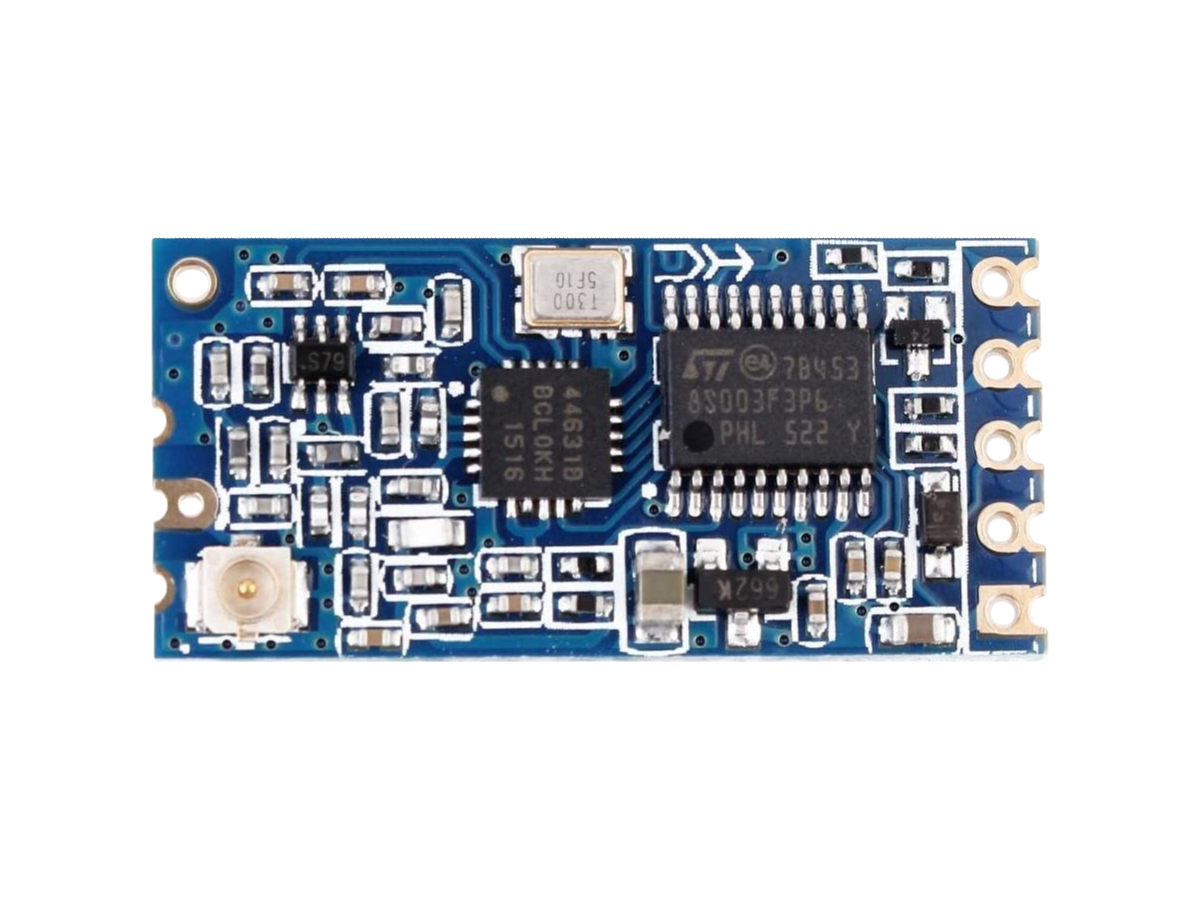
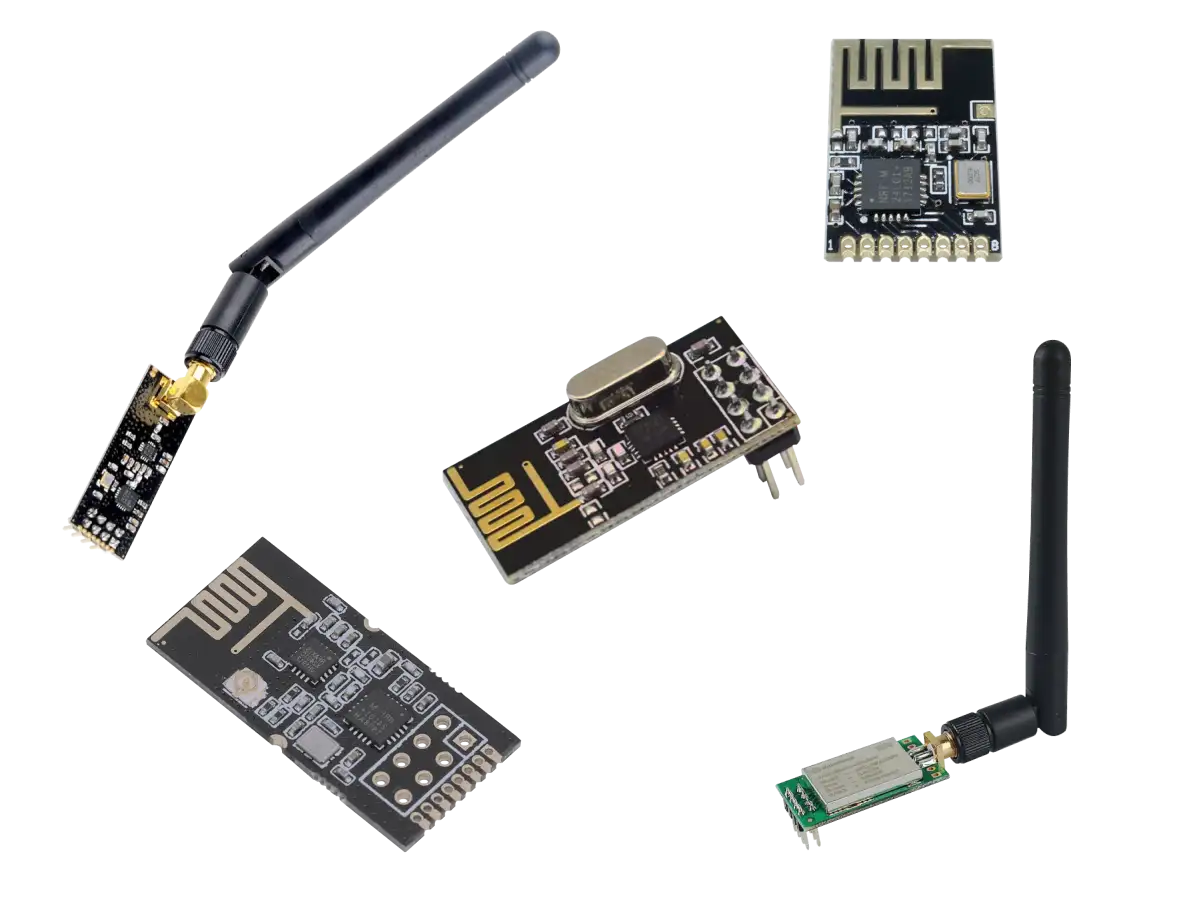

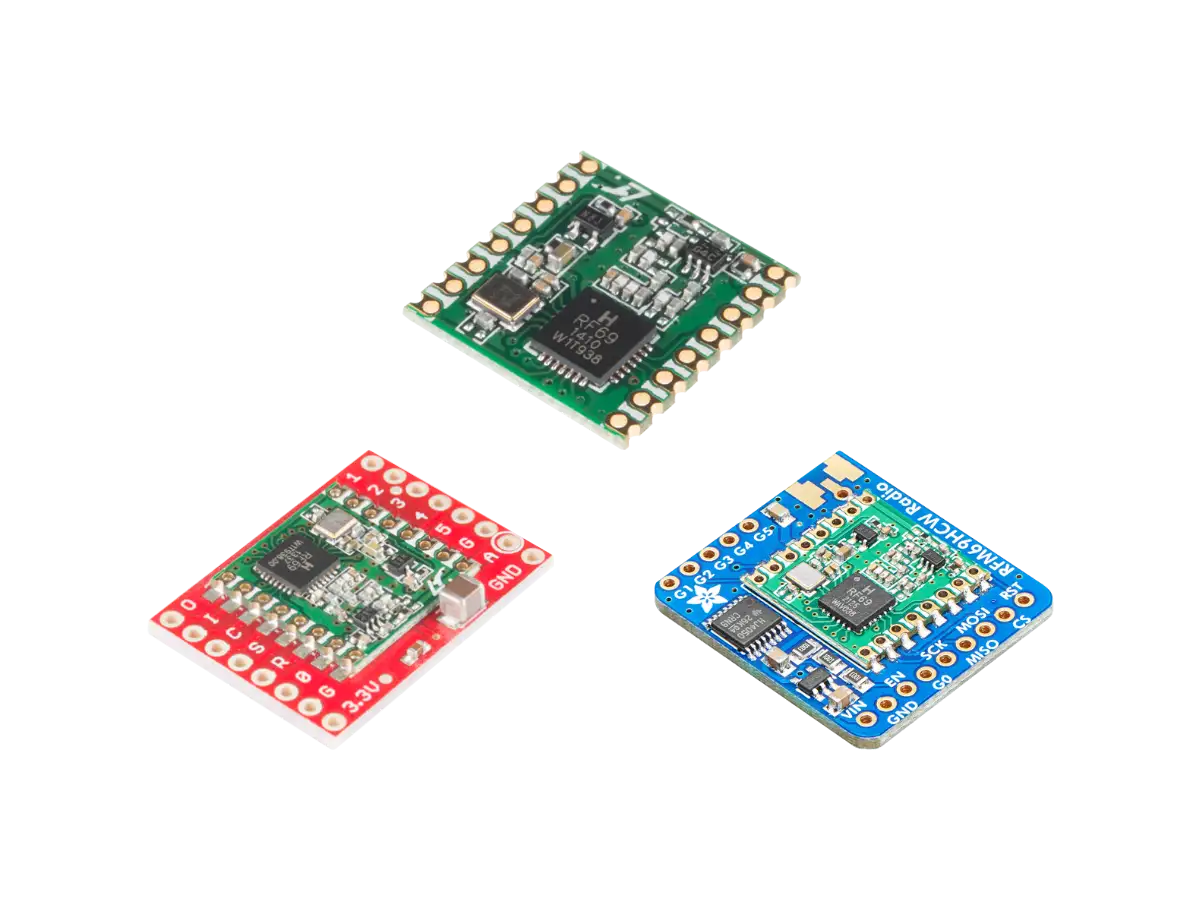
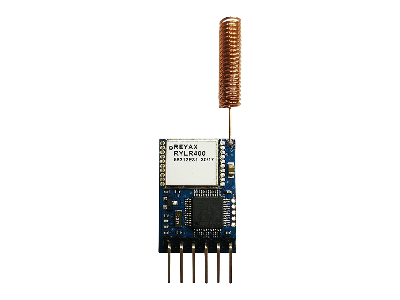
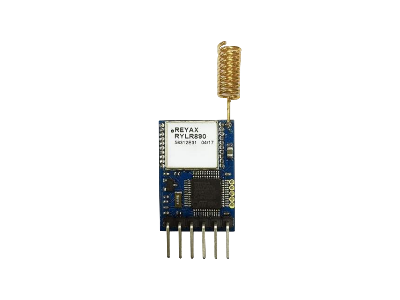
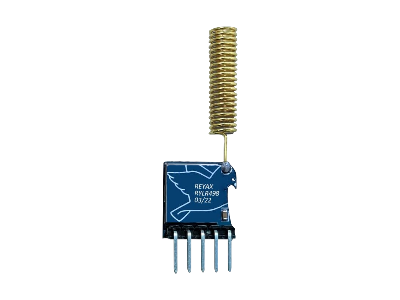
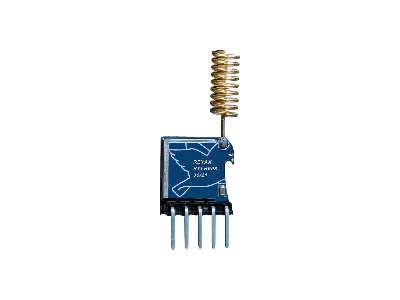
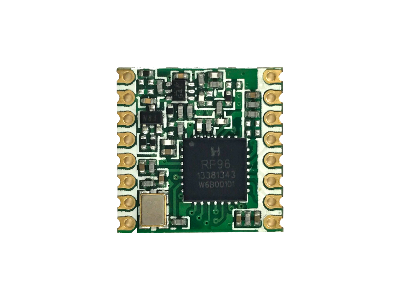
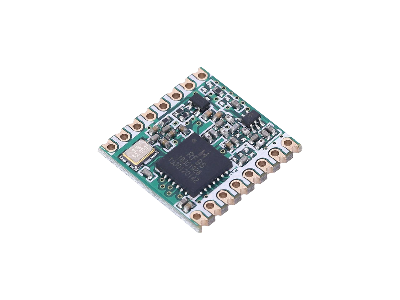
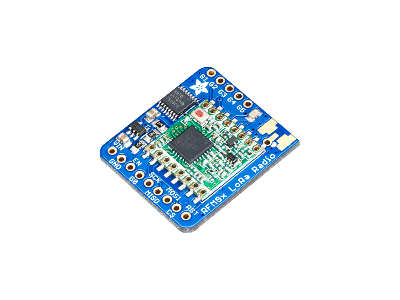
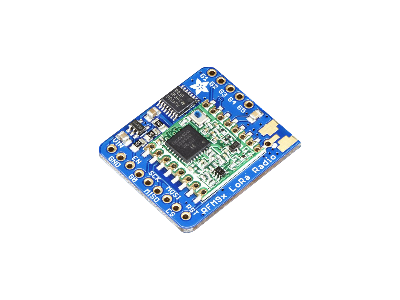
(0) Comments
Sign in to leave a comment
Sign In